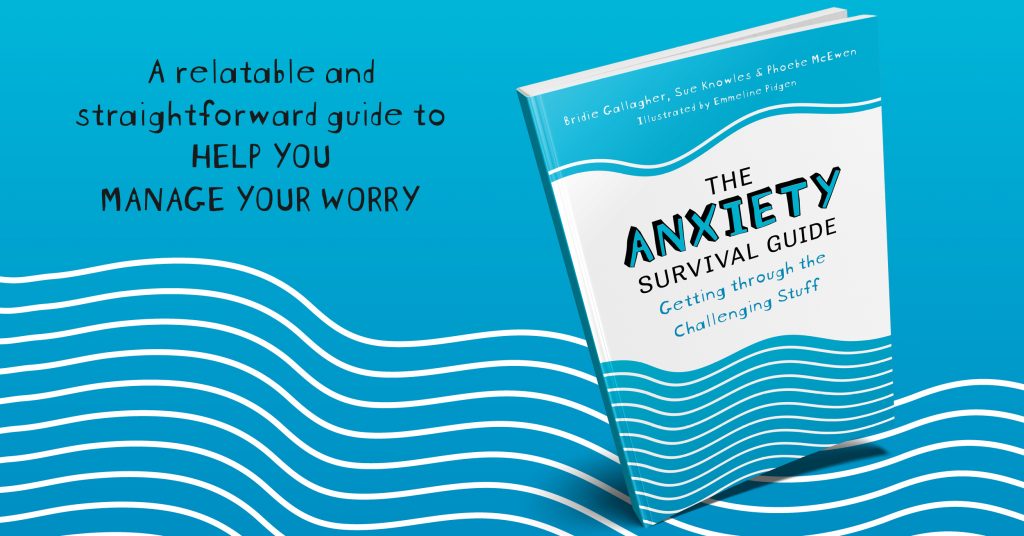Sue Knowles and Bridie Gallagher are both Clinical Psychologists and alongside Phoebe McEwen, a college student who has experienced anxiety herself, wrote ‘The Anxiety Survival Guide’, a book that helps young people to calm their minds and manage anxiety and stressful experiences. Read below their own experiences of anxiety and imposter syndrome:
Last year, we published our first book ‘My Anxiety Handbook: Getting Back on Track’. We had been talking about doing this for a few years; complaining that there was nothing we could use that seemed to be written for young people and wanting to make use of our experiences of helping people to overcome anxiety and worries. We decided that we would finally use our knowledge of what works (from a psychological perspective) and also try to collate young people’s stories of what had worked for them, so that teens could benefit from our experience as psychologists, but also hear from young people just like them. We initially thought that it could be pretty straightforward – between us we had a PhD in childhood anxiety, two doctorates, and over ten years’ experience working with young people in a range of settings. We spent a lot of our working lives talking with young people and their families about anxiety and distress, and even when we were not working with patients, we regularly spoke with each other about anxiety (mostly ours) and what we have found to help. However, nothing quite prepared us for what we felt when we first handed our book in.
One of the worst things about being a psychologist is that everyone thinks you are some sort of paragon of mental wellbeing and your life goes without a hitch because you know how to deal with EVERYTHING (either that or they just think you are totally bonkers). Sometimes it can feel like you are totally in control. Most of the time, just about managing. It does come in handy knowing how to cope with anxiety and distress, but I defy even the calmest, most balanced person, to be able to remain zen when an articulate 14-year-old is telling you how pointless all your hard work is. Especially if you read your reviews at 2am because you have been avoiding opening the email all night.
To be honest, it started way before the reviews came in. Pretty much from the moment we handed in the manuscript, we suddenly realised that we had put something out there in the world and it was going to be seen and it was going to be judged. Or maybe it wasn’t. Was it better or worse if no one even bothered reading it or if they read it and thought its tripe? We were both trying to manage our thoughts on the theme of, “Erm, what are we actually doing? What the hell made us think that we know enough to actually write a BOOK on anxiety!?”
Then the imposter syndrome hit. “We are going to be SO JUDGED by all the other psychologists out there and everyone who ever thought I was good at my job will know that I am, essentially, a fraud.”
Subsequently, there were the ‘What-ifs’: “What if we have made some MASSIVE error? What if we unknowingly plagiarised a colleague? What if we mistyped a statistic? What if we end up shamed publicly, lose our jobs, and end up having to be a TV psychologist on an unknown Sky channel?”
There was the avoidance – no thank you I would rather not know what #viciousteenagecritic thinks about the book, I am tidying my receipt drawer. Mostly we just tried to forget all about the book; see chapter Three “Avoiding Avoidance”.
There were the obvious physical reactions – heart racing, jumping up, feeling sick every time an email popped up from the publisher. Not being able to focus and having to read the email about 14 times so we had calmed down enough to make sense of it. Then a phone call to make sure it wasn’t bad, everything was fine, and it definitely didn’t mean that everybody hated it (and by extension, us).
As we don’t like to be hypocrites, we spoke about this with each other a lot. Many late night what-apps, saying “We haven’t messed this up have we?”, encouraging phone calls, making sure that we got enough sleep, helping each other to challenge our thoughts, regular mindfulness etc.
So, what does this reaction tell us? Firstly, that anxiety is NORMAL. Completely normal. Especially when we push ourselves to do something out of our comfort zones, or something that might make us feel under threat or a bit exposed. Furthermore, although it’s uncomfortable, anxiety doesn’t kill you – although it may often feel like it will. Despite all of the above, we decided to write another book about anxiety (for 18-25 years olds), and we have to say that this time, our anxiety has lessened a little. We know it will be scary at times, and we will have moments of absolute fear. But most importantly perhaps, we have learned that we can get through it…with a little support from each other (and chocolate).
If you would like to read more articles like this and get the latest news and offers on our health care books, why not join our mailing list? We can send information by email or post as you prefer. You may also be interested in liking our Special Education and PSHE Facebook page.
